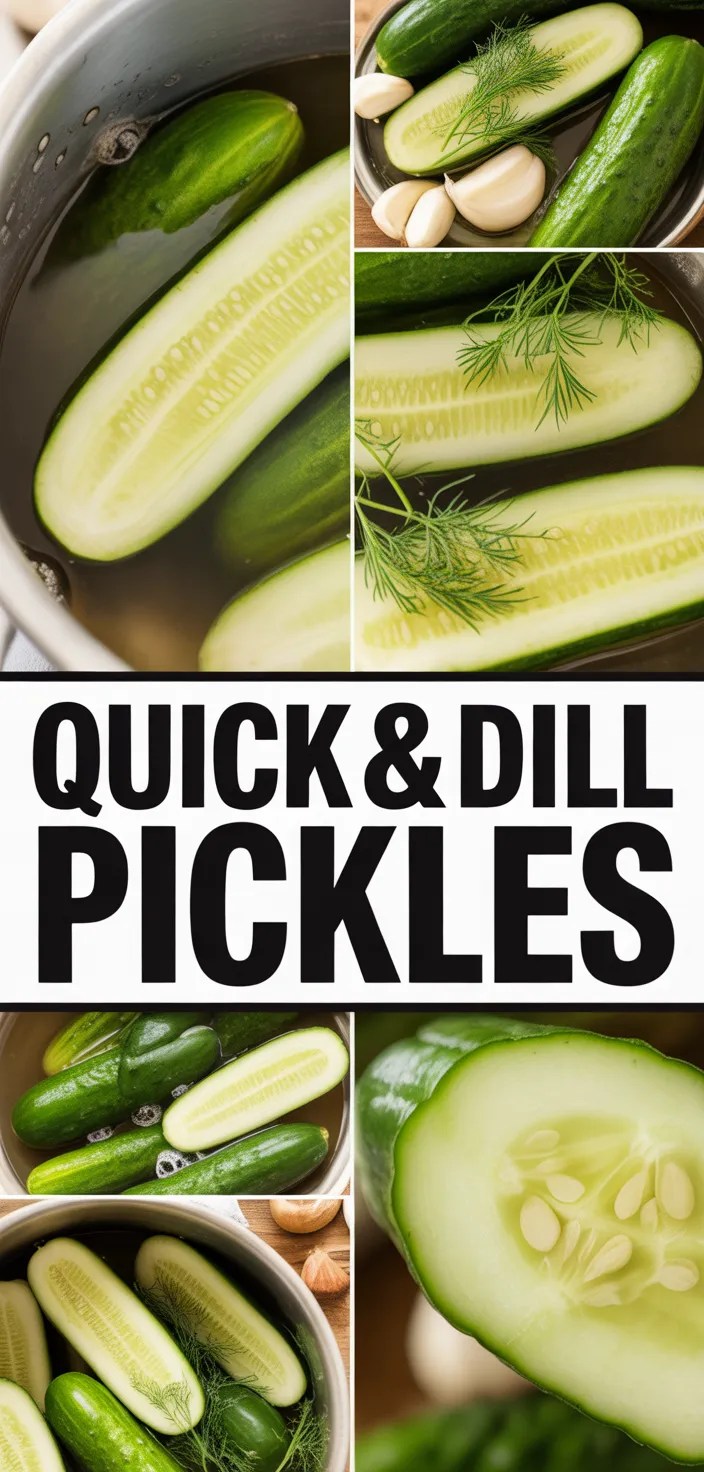I turned a summer bounty of cucumbers into crunchy Quick Homemade Pickles that had my family sneaking jars before dinner.

I never thought a jar could change a summer until I made these Quick & Easy Refrigerator Dill Pickles. I’m not gonna lie, they’re crunchier than anything I bought, and weirdly addictive.
They start with small pickling cucumbers and lots of fresh dill sprigs to give that bright, savory aroma. This Refrigerated Dill Pickles Recipe skips the scary canning stuff, but I picked up a couple tiny tricks that keep them crisp and tangy.
If you’ve got a cucumber glut, or just curious, you’ll want to try them. Fair warning, once you taste one they disappear fast.
Ingredients

- Cucumbers are crisp, low calorie, mostly water, give fiber and vitamin K.
- White vinegar gives bright sour tang, it’s acetic acid that preserves, no calories.
- Dill adds fresh aromatic flavor, has antioxidants and subtle citrusy notes.
- Garlic adds savory bite, contains vitamin C compounds, might help fight colds.
- Salt is essential for brine, firms cucumbers by drawing moisture, but it’s high sodium.
- Sugar balances sourness and rounds flavor, optional, adds simple carbs if used.
- Peppercorns add warm bite and subtle heat, mostly flavor with minimal calories.
- Pickling spice blends lend complexity, can include mustard, coriander and warming seeds.
Ingredient Quantities
- 2 to 3 pounds small pickling cucumbers (Kirbys or Persian cucumbers)
- 2 cups distilled white vinegar (5% acidity)
- 2 cups water
- 2 tablespoons kosher salt or pickling salt
- 1 to 2 tablespoons granulated sugar (optional)
- 6 to 8 garlic cloves
- 4 to 6 fresh dill heads or 8 to 10 fresh dill sprigs
- 1 tablespoon pickling spice (or 1 teaspoon each mustard seed and coriander seed)
- 1 teaspoon whole black peppercorns
- 1/2 teaspoon crushed red pepper flakes (optional)
- 2 bay leaves (optional)
- Ice cubes for crisping cucumbers (optional)
How to Make this
1. Wash 2 to 3 pounds small pickling cucumbers, trim a tiny bit off the blossom ends (that end makes them go soft), then leave whole if small or slice into spears or rounds so they fit your jars.
2. Crisping trick: soak the cucumbers in ice water for 20 to 30 minutes, or if you’re short on time pack them dry and drop a few ice cubes into each jar just before adding brine so they stay crunchy while the hot brine cools.
3. Put clean jars on the counter (no canning needed). Into each jar layer fresh dill heads or sprigs (4 to 6 heads or 8 to 10 sprigs total for the batch), 1 or 2 garlic cloves per jar (you’ll use 6 to 8 total), 1 teaspoon whole black peppercorns per jar (total 1 tsp listed), and divide 1 tablespoon pickling spice among the jars (or use 1 teaspoon each mustard seed and coriander seed instead). Add 1/2 teaspoon crushed red pepper flakes and a bay leaf to any jars you want a little heat and depth.
4. Pack the cucumbers tightly but not smashed into the jars around the aromatics so they’re mostly upright and have some room for brine to circulate.
5. Make the brine in a saucepan: combine 2 cups distilled white vinegar (5% acidity), 2 cups water, 2 tablespoons kosher salt or pickling salt, and 1 to 2 tablespoons granulated sugar if you want a touch of sweetness. Heat just until the salt and sugar dissolve and the liquid comes to a simmer, then remove from heat. No need to boil forever, just hot enough to dissolve things.
6. Pour the hot brine over the cucumbers so they’re fully submerged, leaving about 1/2 inch headspace at the top of each jar. If you used ice cubes, they’ll melt and help cool things down, its fine. Tap the jars gently or use a utensil to release trapped air bubbles.
7. Wipe rims clean, screw on lids snugly, and let jars cool to room temperature on the counter for 30 to 60 minutes.
8. Refrigerate the pickles. They’ll be edible in 24 hours but taste much better after 48 hours. Keep in the fridge for up to 3 to 4 weeks for best quality.
9. Quick tips: use 5% vinegar only, don’t overcook the brine or you’ll flatten the flavor, trim the blossom end to keep crunch, and label jars with the date so you know when to eat them.
Equipment Needed
1. Clean mason jars with lids (pint or 16 oz works best)
2. Cutting board
3. Sharp chef’s knife or paring knife
4. Large bowl for ice water and ice cubes
5. Saucepan to heat the brine
6. Measuring cups and measuring spoons
7. Small funnel or ladle for pouring brine into jars
8. Wooden chopstick or small spatula to coax out air bubbles
9. Kitchen towel or oven mitts for handling hot jars
FAQ
Quick & Easy Refrigerator Dill Pickles Recipe Substitutions and Variations
- Distilled white vinegar: swap for apple cider vinegar or white wine vinegar 1 to 1, they give a fruitier tang. Rice vinegar works too but is milder so you might want a splash more acid.
- Kosher or pickling salt: use fine sea salt or table salt but cut the volume down. Start with about half to three quarters the amount of table salt compared to kosher and taste as you go.
- Fresh dill heads or sprigs: dried dill weed or dill seed are fine. Use about 1 tablespoon dried dill weed or 1 teaspoon dill seed for the fresh amount. Fennel fronds give a nice anise note if you want to try something different.
- Garlic cloves: substitute 1 teaspoon garlic powder or 1 tablespoon jarred minced garlic for every 6 to 8 cloves, or use 1 small shallot for a milder, sweeter flavor. Roasted garlic is great if you want softer, sweet garlic notes.
Pro Tips
– Taste the brine before you jar things. It should taste like seawater, salty but not painful. If it seems weak add a bit more salt, if it feels too strong add water. Using a kitchen scale for the salt makes results consistent since tbsp sizes vary.
– Keep cucumbers crunchy by adding a tannin source like a grape leaf to each jar or a pinch of food grade calcium chloride sold as Pickle Crisp. These work better than messing with baking soda or overcooking the brine, which will wreck texture.
– Wake up the spices. Lightly toast whole spices in a dry pan and crush them just before jarring, and gently smash garlic cloves to release more aroma. A small piece of fresh horseradish or an extra mustard seed will give more bite without overpowering the cucumbers.
– Chill and check. Refrigerate promptly and let the pickles rest at least 48 hours before you judge them. They stay best about 3 to 4 weeks in the fridge. If the brine becomes cloudy it is often harmless, but toss the jar if you detect a rotten smell, sliminess, or fuzzy mold.

Quick & Easy Refrigerator Dill Pickles Recipe
I turned a summer bounty of cucumbers into crunchy Quick Homemade Pickles that had my family sneaking jars before dinner.
12
servings
31
kcal
Equipment: 1. Clean mason jars with lids (pint or 16 oz works best)
2. Cutting board
3. Sharp chef’s knife or paring knife
4. Large bowl for ice water and ice cubes
5. Saucepan to heat the brine
6. Measuring cups and measuring spoons
7. Small funnel or ladle for pouring brine into jars
8. Wooden chopstick or small spatula to coax out air bubbles
9. Kitchen towel or oven mitts for handling hot jars
Ingredients
2 to 3 pounds small pickling cucumbers (Kirbys or Persian cucumbers)
2 cups distilled white vinegar (5% acidity)
2 cups water
2 tablespoons kosher salt or pickling salt
1 to 2 tablespoons granulated sugar (optional)
6 to 8 garlic cloves
4 to 6 fresh dill heads or 8 to 10 fresh dill sprigs
1 tablespoon pickling spice (or 1 teaspoon each mustard seed and coriander seed)
1 teaspoon whole black peppercorns
1/2 teaspoon crushed red pepper flakes (optional)
2 bay leaves (optional)
Ice cubes for crisping cucumbers (optional)
Directions
- Wash 2 to 3 pounds small pickling cucumbers, trim a tiny bit off the blossom ends (that end makes them go soft), then leave whole if small or slice into spears or rounds so they fit your jars.
- Crisping trick: soak the cucumbers in ice water for 20 to 30 minutes, or if you’re short on time pack them dry and drop a few ice cubes into each jar just before adding brine so they stay crunchy while the hot brine cools.
- Put clean jars on the counter (no canning needed). Into each jar layer fresh dill heads or sprigs (4 to 6 heads or 8 to 10 sprigs total for the batch), 1 or 2 garlic cloves per jar (you’ll use 6 to 8 total), 1 teaspoon whole black peppercorns per jar (total 1 tsp listed), and divide 1 tablespoon pickling spice among the jars (or use 1 teaspoon each mustard seed and coriander seed instead). Add 1/2 teaspoon crushed red pepper flakes and a bay leaf to any jars you want a little heat and depth.
- Pack the cucumbers tightly but not smashed into the jars around the aromatics so they’re mostly upright and have some room for brine to circulate.
- Make the brine in a saucepan: combine 2 cups distilled white vinegar (5% acidity), 2 cups water, 2 tablespoons kosher salt or pickling salt, and 1 to 2 tablespoons granulated sugar if you want a touch of sweetness. Heat just until the salt and sugar dissolve and the liquid comes to a simmer, then remove from heat. No need to boil forever, just hot enough to dissolve things.
- Pour the hot brine over the cucumbers so they’re fully submerged, leaving about 1/2 inch headspace at the top of each jar. If you used ice cubes, they’ll melt and help cool things down, its fine. Tap the jars gently or use a utensil to release trapped air bubbles.
- Wipe rims clean, screw on lids snugly, and let jars cool to room temperature on the counter for 30 to 60 minutes.
- Refrigerate the pickles. They’ll be edible in 24 hours but taste much better after 48 hours. Keep in the fridge for up to 3 to 4 weeks for best quality.
- Quick tips: use 5% vinegar only, don’t overcook the brine or you’ll flatten the flavor, trim the blossom end to keep crunch, and label jars with the date so you know when to eat them.
Notes
- Below you’ll find my best estimate of this recipe’s nutrition facts. Treat the numbers as a guide rather than a rule—great food should nourish both body and spirit. Figures are approximate, and the website owner assumes no liability for any inaccuracies in this recipe.
Nutrition Facts
- Serving Size: 175g
- Total number of serves: 12
- Calories: 31kcal
- Fat: 0.2g
- Saturated Fat: 0g
- Trans Fat: 0g
- Polyunsaturated: 0g
- Monounsaturated: 0g
- Cholesterol: 0mg
- Sodium: 916mg
- Potassium: 142mg
- Carbohydrates: 4.9g
- Fiber: 0.5g
- Sugar: 3.1g
- Protein: 0.7g
- Vitamin A: 47IU
- Vitamin C: 2.7mg
- Calcium: 15mg
- Iron: 0.27mg











